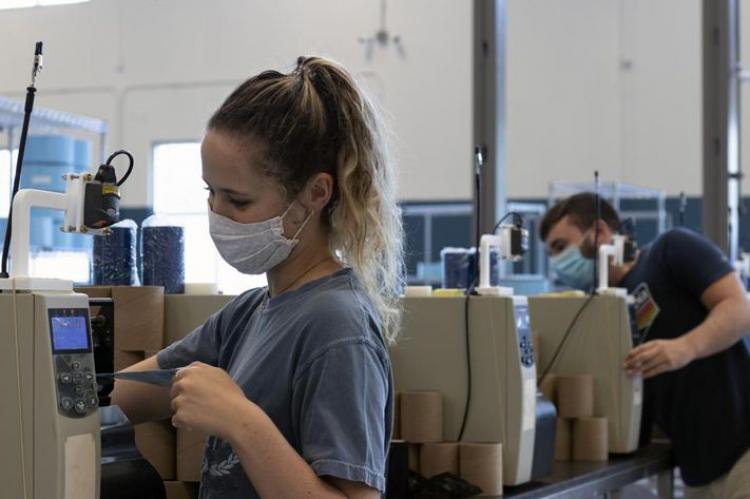The Legal Cannabis Industry Is Creating A New Workforce Amidst The Pandemic
Despite being a nascent and still federally illegal operation, most states deemed cannabis companies and ancillary services as essential businesses when COVID-19 hit the U.S. Since that time, consumer demand has sustained – if not grown – and patients have been able to continue getting their medicine. Now, the legal cannabis industry is looking towards the future and “new normal” with expanding, legitimized workforces that have kept the industry alive during a national economic downturn.
According to Marijuana Business Daily’s Annual Marijuana Business Factbook, U.S. medical and adult-use cannabis sales will reach at least $15 billion in 2020, an almost 40% increase from last year. It also predicts industry employment could reach almost 300,000 full-time jobs this year, a 50% increase from 2019. To put those figures in perspective, the number of jobs in the cannabis industry would be about the same as the beverage industry and computer programming. It’s important to keep in mind, only 11 states have completely legal adult-use markets. As cannabis becomes legalized in all 50 states, it’s easy to see its employment surpassing other, more established industries.
The cannabis sector is one of the fastest growing industries in the United States, creating a new workforce amidst the current health and economic crisis. Ohio’s medical market has already created 600 new jobs, a 21% increase since February. And cannabis companies in states ranging from Maryland and Virginia to Oregon are continuing to grow their workforce. A recent report using data from cannabis staffing firm Vangst found 68% of companies plan to increase headcount during the second half of 2020.
“Remote hiring for non-plant-touching roles is becoming increasingly common, in keeping with many other sectors, and new employee safety protocols and procedures on the plant-touching side are absolutely shifting the workforce experience,” said Karson Humiston, Founder and CEO, Vangst. “Interestingly, though, we’re also seeing a lot of candidates coming in saying that the recession – and either the loss of their last role or the inability to find a new one – was the nudge they needed to actively seek work in the cannabis industry. These candidates have been curious about cannabis for quite some time but hadn’t been motivated previously to make the transition from a mainstream career that previously felt more stable and less risky.”
As markets continue to mature and businesses grow there’s an increased need for professional services. In states where the industry is maturing, it’s attracting professionals who, in the past, may have turned away from a career in the cannabis industry. This is a similar pattern to when Colorado voters approved a constitutional amendment to create casinos in 1990. It took a few years before the state’s labor market began to have broad acceptance of employment at casinos. Similarly, people with professions in law enforcement, private security or technology vendors – who in the past would not have associated with the illicit cannabis market – have warmed up to the idea of lending their services to the newly legalized industry.
At the same time, state leaders have been increasingly addressing inequalities in how the industry was built, activists are lobbying state governments for much-needed social equity programs, and employees are taking a look in the mirror and asking their own company leadership to address diversity and inclusion in their office. “Many of the candidates we’ve seen come in lately have expressed a high interest in companies that embrace social equity in their hiring practices or actively champion the cause itself,” said Humiston. “We’re hoping this continues.”
The growth of cannabis industry workers facing a myriad of state policies and regulations has also highlighted the need for good jobs and the role of labor unions. The United Food and Commercial Workers (UFCW) launched a Cannabis Workers Rising campaign in 2010 and today represents tens of thousands of cannabis workers across multiple states. In August, employees at a cannabis cultivation facility in Massachusetts voted to join a local UFCW union, following other cannabis employees’ lead in the state.
“Unionized cannabis shops offer workers livable wages, career pathways and job security, in addition to the latest training to address any safety issues in the industry,” said Jeff Ferro, National Director, Cannabis Workers Rising. “As the labor union representing the largest number of workers in the cannabis industry, UFCW works hard to keep our workers and cannabis-related businesses safe by making sure workers are protected and cannabis is sold safely. When workers are backed up by the strength that comes from standing together in their union, they know they can stand up for the safety of their workplace as well as consumers and communities.”
At a time when many industries are not making any new moves in an effort to stay afloat, many cannabis industry leaders have been nimble and proactive. This can be seen in the almost seamless switch to e-commerce and will continue to see it in the workforce. “We’re showing other industries what can happen when you prioritize grit, innovation, and collaboration across everyone in our industry who is ready to get cannabis to work,” said Humiston. And, in its own self-reflection, the cannabis industry has shown exactly how it plans to get to work.
- Log in to post comments

